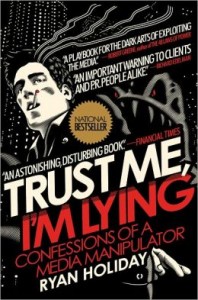 At a recent conference, I ran into an old acquaintance, Jeff Corbett. During an address to the conference attendees, he mentioned Neil Postman’s Technopoly. Over a beer later in the evening, we discussed the implications of technology, and I recommended he read Postman’s Amusing Ourselves to Death, which I though was a better read than Technopoly. In return he suggested I check out Trust Me, I’m Lying : Confessions of a Media Manipulator by Ryan Holiday. I just finished it, and I expect it will have a lasting effect on how I consume media, particularly online media.
At a recent conference, I ran into an old acquaintance, Jeff Corbett. During an address to the conference attendees, he mentioned Neil Postman’s Technopoly. Over a beer later in the evening, we discussed the implications of technology, and I recommended he read Postman’s Amusing Ourselves to Death, which I though was a better read than Technopoly. In return he suggested I check out Trust Me, I’m Lying : Confessions of a Media Manipulator by Ryan Holiday. I just finished it, and I expect it will have a lasting effect on how I consume media, particularly online media.
The short summary is that the book is a great companion to Amusing Ourselves to Death. It lays out how online media, blogs in particular, can be and are used to influence public opinion. Postman did the same with his book, revealing how television, the modern technology of his day, was altering public discourse. In fact, Holiday’s work shows how the projections portrayed in Postman’s work have come to pass.
The book presents three principles regarding today’s online media industry:
- “New age” journalism is not journalism
The vast majority of online news sources of today’s age, blogs, are not journalism. Instead of racing to check facts and verify sources, the industry is driven by a race to be first to publish in order to drive pageviews. In other words, being right isn’t what matters, getting the most pageviews is the key to success. - Blogs are driven by advertising through pageviews
A blogger is not measured by the quality of the material they write, but by the number of pageviews they get, which generates money through advertising. This leads to a rush to the bottom where content quality is traded off against sensationalized headlines, gossip, rumors, and manufactured conflict used to entice users to click on articles. - The advertisers control the spin cycle
Since advertisers make a blog’s world go round, bloggers have an incentive to spin them in the most positive light possible. These advertisers have the power to influence the tone of stories about them, or their competitors. The days of being noble and true to the profession have been traded for a land grab to get the largest share of the limited user time, attention, and money available on the internet.
While I sort of figured these things were happening, it was an eye opener to see the extreme to which they had been taken. It was much farther than I had imagined, which shouldn’t surprise given the money and influence (power) at stake.
During and since reading the book, my skepticism of articles I read on the internet has gone up. I’m more cautious about being duped and clicking through to an article based on its headline. I feel as though I’ve become a bit smarter about the content I consume, and I’m always looking to make sure I understand any underlying motivations of the author or site. It has helped me become more selective and less influenced by the shear amount of content that is available on the internet and screaming for my attention. I’m confident that it will have a lasting impact on how I consume online, and even offline, content.
Needless to day, I’ve put this book in my must read category. I strongly believe that this book, along with Amusing Ourselves to Death, is critical to understanding how technology has changed media and is influencing public discourse. I wish and hope that more people would read these books so we can move away from a media driven by money, greed, and power to one more concerned about the fourth estate’s true mission – seeking out the truth. Today, we’re letting the former shape and influence the general public’s thinking. It will take enlightenment and education to affect change and restore trust and integrity to our media. Unfortunately, it may be too late. I can only hope that we haven’t passed the point of no return and that some day the tide will turn.
As a footnote to this review, I picked up a valuable item and lesson from the experience. The item is another book for my 2014 reading list, courtesy of Ryan Holiday. It’s The Image: A Guide to Pseudo Events in America by Daniel J. Boorstein. It was first published in 1962 but lays the foundation of how events like press conferences are used to create the illusion of celebrity. The lesson was another reason for why I read. It allows me to build a common bond and share ideas with people I meet, or already know. I find it leads to deeper conversations than discussing pop culture such as movies, television or sports. It only reinforces my feelings as to why it is so important to read on a regular basis, both non-fiction and fiction.

Pingback: My 2014 reading goals and list | Gregg Borodaty
Pingback: The power of leaks
Pingback: Mid-year progress report on 2014 goals
Pingback: Book review: The Image - A Guide to Pseudo-Events in America